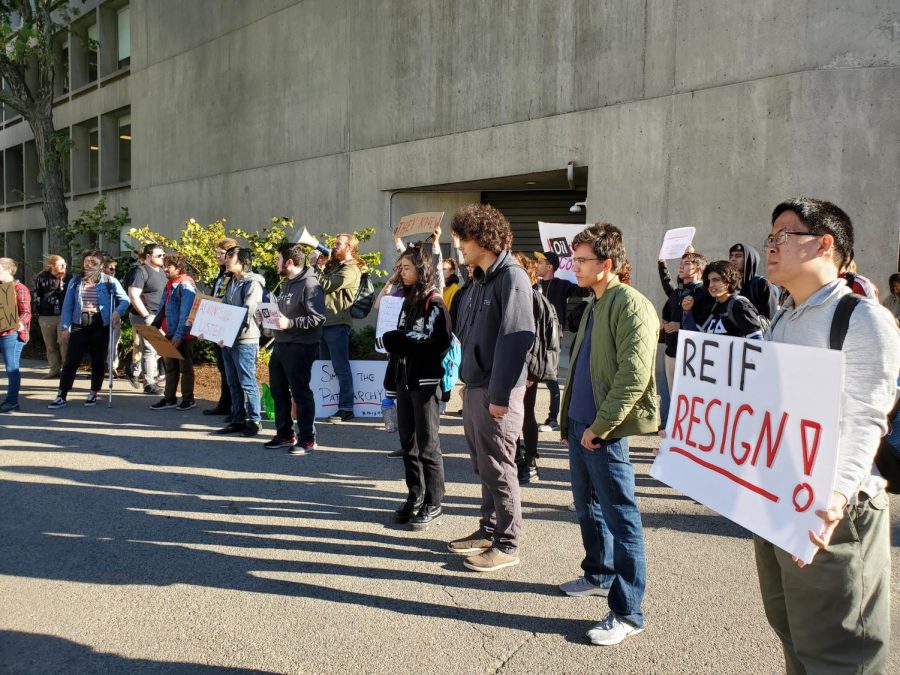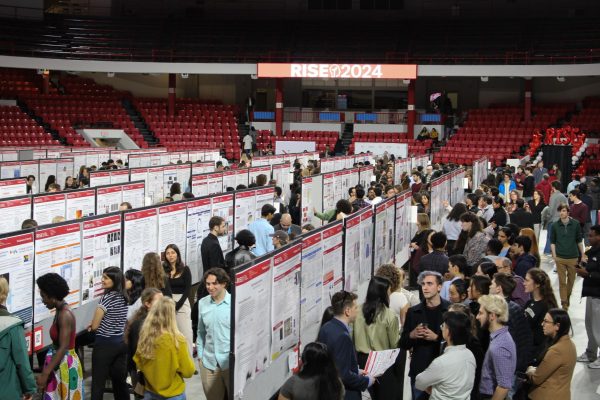Protesters rally, march during MIT Corporation annual meeting
MIT students and faculty protested the administration’s financial ties at the annual MIT Corporation meeting last Friday.
October 9, 2019
MIT students and faculty joined community members at the Stratton Student Center and marched to North Court to speak out against MIT’s ties to Jeffrey Epstein and David Koch, among other individuals, during the MIT Corporation’s annual meeting.
The rally was organized by the MIT Justice Solidarity and Transformation Coalition, or JuST, a group within MIT Students Against War. Protesters’ chants rang as they marched through the halls of the MIT School of Architecture and Planning.
“I’m very concerned about MIT’s leadership ethics in taking money from Epstein and the way that they have been dismissive of student concerns,” said Edmund Bertschinger, a physics professor at MIT who protested at the rally.
After arriving in North Court, where tents were set up for the annual meeting, students presented more speeches and stated their demands — primarily MIT President L. Rafael Reif’s resignation — until the Corporation members entered the tents.
Speakers included students from across university campuses, as well as MIT faculty and alumni, many of whom brought up ethical concerns regarding MIT’s relationships, including the institute’s intentional coverup of donations received from late financier and convicted sex offender Jeffrey Epstein, its financial ties to the Blackstone Group and its relationship with the Kingdom of Saudi Arabia.
Along with demanding Reif’s resignation, protesters called for the resignation of Professor of Mechanical Engineering Seth Lloyd and several members of the MIT Corporation. Others led chants to “democratize MIT” and called for the creation of a faculty-led senate who would have a final say in donations accepted by MIT.
Organizers said MIT has not responded to their protests, a point of concern for them.
“It’s mostly been radio silence, and that’s concerning because a lot of people really want to hear a response,” said Nathan Foster, an organizer with UnKoch My Campus from Tufts University.
Kimberly Allen, the director of media relations at MIT News, provided thoughts on the protest in an email to The News Sunday.
“Advocacy and protest have long had a role in the MIT community,” Allen said.
The MIT administration was unavailable for an interview on the protest, and the MIT Corporation did not respond to a request for comment.
Reif addressed the issue of donations in introductory remarks at an Oct. 2 MIT Climate Symposium.
“I would like to acknowledge that this is a serious moment in the life of the MIT community … In this era of growing fortunes and shrinking federal funds, it is clear that as a community, we need to consider many questions,” Reif said. “We need to understand the changing nature of the donor population. We need to decide how to weigh the political, cultural and economic impacts of donors’ behavior – and much more.”
On Oct. 1, a student forum was hosted by the Undergraduate Association and the Graduate Student Council to discuss the institute’s association with Epstein, which Reif attended.
But MIT Students Against War organizer Husayn Karimi says he remains skeptical of Reif’s words.
“When Reif says he cares about our views in the student assembly, we don’t really see that in action,” Karimi said.
Karimi also talked about a sit-in that took place in front of Reif’s office over the span of weeks to highlight continued discontent from students.
“It’s only recently that Rafael Reif acknowledged this movement sitting outside of this office,” Karimi said.
Bertschinger also spoke on his thoughts regarding the effectiveness of the protest.
“I think that the administration is probably nervous about the protests … One of the most effective parts of the protest was to sensitize the very senior leaders of the MIT Corporation, including the chairman of MIT, Robert Millard, to the serious concerns and anger of the students,” Bertschinger said.
MIT Students Against War organizer Alonso Espinola said even in light of faculty resignations such as that of Media Lab Director Joi Ito, their group hopes to use those concessions to maintain momentum.
“Our job … is to use small victories to build a movement and not demobilize,” Espinola said.
Organizers discussed their future plans, including marching again during the MIT Corporation’s quarterly meetings, hosting educational events, starting a petition through the JuST coalition and meeting directly with Reif. They hope this protest will encourage other students to become event organizers themselves, and passed out sign-up sheets to those present.
“I’m very hopeful about mobilizing students,” Espinola said.


















